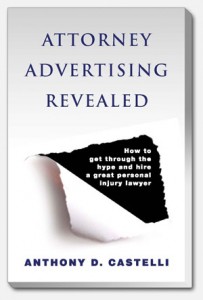You’ve met your client, executed your fee agreement, gathered your facts and put your file together. When is it time to consider settlement? You get a very lawyered up answer on this: It depends on the case. But here are some thoughts for personal injury lawyers as to when settlement should be broached.
First and foremost, check the statute of limitations. Unless it is at least six months away, file your complaint. Don’t wait assuming you will settle. I could argue that you want to file even more quickly whenever practicable. You really do want to avoid sitting up on the statute of limitations. Literally hundreds of legal malpractice lawsuits have resulted from personal injury lawyers who have thought the case was “sure to settle” only to get hit over the head with an expiring statute of limitations or a failure to gather all of the right defendants in time.
You can always serve the defendant, send a copy to the claims representative with whom you’ve been dealing, and agree to take no further action during a fixed time period, during which it is understood that settlement negotiations will be addressed. Also be sure early on, when opening your file, whether there are any statutory notice provisions with which you must comply pre-suit. Claims against state and local governments typically have provisions such as these, which require specific notice to be given to designated officials. The time limits for providing notice are usually much shorter than the statutory limitations period for the cause of action, and providing notice is generally a prerequisite to being able to file a lawsuit. Miss one of these and the next thing you will get is a motion to dismiss, followed shortly by a bar complaint, a claim for legal malpractice, or both.
If you do not have an impending limitations problem, you may wish to approach settlement as shortly after the date of the accident as possible, usually within the first year and well before filing your complaint, if:
• The facts situation is clear
• You have identified the defendant
• Damages are modest; and
• Liability is clear, whether or not it is in your favor.
In every case where limitations is not an issue, settlement discussions should not begin until your injured client has reached maximum medical improvement. What is maximum medical improvement? It is the point in time when your client’s injuries are completely healed, or he has reached the maximum benefit medical treatment will provide and his injuries have become permanent. Generally, I advise not approaching settlement discussions until the client has been at maximum medical improvement for at least ninety days. This allays fears that follow-up treatment will be needed for any remaining residual complaints, or that the client has merely plateaued and will heal further with the passage of time. Also, in the event of a permanent injury, you will need some time after the completion of medical treatment to secure documentation of the permanent nature of the client’s injuries. Moreover, if those injuries will affect the client’s ability to work or to earn an amount comparable to his pre-injury wages, you will need time to secure additional documentation of those damages, such as a vocational assessment, or a report from an economist. Make sure you don’t fail to seek recoverable damages in a premature rush to the settlement table.
One more important lesson worth keeping in mind. I remember as a young lawyer thinking it was a sign of weakness to seek out settlement. I defended a case once where the plaintiff’s lawyer was begging the defendant’s to settle from the very beginning. While begging, he worked up his case right, put on a great four month trial, and got a $2 million verdict against us. When I asked him about it, he said I want to settle every case up until the time the high court affirms my verdict. My take home message from this is not to be afraid to seek settlement as long as you are doing all of the right things to get ready to try your case.
Ronald V. Miller, Jr. is a personal injury lawyer . You can learn more about Ron and his law firm here.
Ronald V. Miller, Jr.
Miller & Zois
This post is offered as a public service by Anthony Castelli Attorney focusing on Ohio injury accident law. I want to thank Ron Miller Esq. for taking time from his busy practice to write this helpful article for attorneys as well as accident and injury victims.
